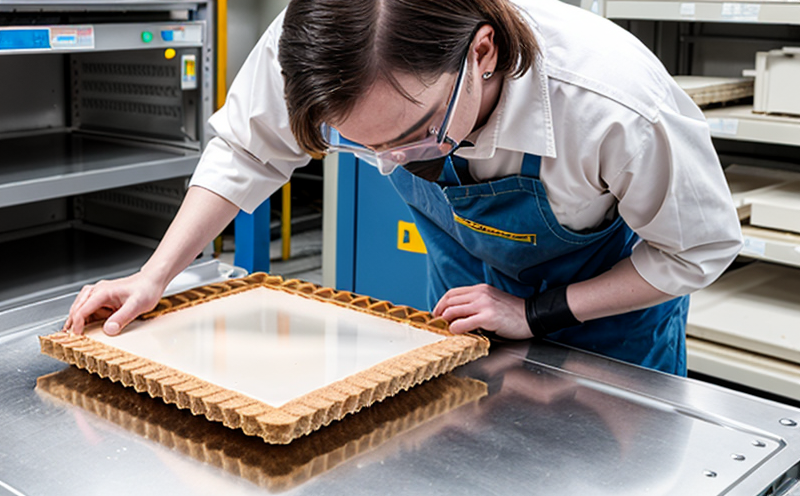SEMI M39 Wafer Thermal Resistance Testing
The SEMI M39 standard is a crucial benchmark in the semiconductor industry, ensuring that wafers and substrates meet strict thermal resistance requirements. This service focuses on evaluating the thermal performance of these materials to ensure they can withstand high-temperature environments without degrading or failing. Thermal resistance testing is critical for the reliability and durability of microchips and other electronic components.
At Eurolab, we employ a comprehensive approach to SEMI M39 compliance, leveraging advanced instrumentation and expertise in semiconductor manufacturing processes. Our team of engineers and scientists understands the unique challenges faced by quality managers and R&D engineers when it comes to ensuring that wafers and substrates meet industry standards.
The test involves subjecting a wafer or substrate to controlled temperature changes while monitoring its thermal resistance. This process is essential for identifying any weaknesses in the material's design and manufacturing processes, which could lead to early failure during use. By adhering strictly to SEMI M39 specifications, we provide customers with reliable data that can be used to improve product performance and reduce potential failures in end-user applications.
Our testing process typically involves several key steps:
- Initial specimen preparation: Wafers or substrates are cleaned according to SEMI M39 standards to ensure consistent test results.
- Temperature cycling: Specimens are subjected to repeated temperature cycles, simulating real-world conditions they may encounter during manufacturing and use.
- Data collection and analysis: Advanced software tools are used to analyze thermal resistance data collected during the testing process.
The results of this testing provide valuable insights into the thermal stability of wafers and substrates, helping manufacturers identify areas for improvement. These findings can then be incorporated into design changes or manufacturing processes to enhance product quality and reliability.
For those involved in R&D, SEMI M39 compliance is essential for ensuring that new materials and designs meet the highest industry standards. Our testing services offer a detailed understanding of how different factors affect thermal resistance, enabling you to make informed decisions about your research and development efforts.
| Parameter | Description |
|---|---|
| Temperature Range | -55°C to 125°C, as specified by SEMI M39 |
| Humidity Control | Relative humidity controlled within ±5% of the target value |
| Thermal Resistance Measurement | Conducted using advanced thermal resistance measurement equipment, including precise temperature sensors and data loggers. |
Scope and Methodology
The SEMI M39 standard defines the testing procedures for evaluating wafer thermal resistance. The scope of our testing includes both laboratory-based tests and field simulations, ensuring that we cover all aspects relevant to your specific needs.
- Initial Specimen Preparation: All specimens are cleaned using industry-standard methods before undergoing any thermal stress tests. This step ensures that the baseline measurements reflect the true properties of the material rather than being influenced by contaminants or residues from previous uses.
- Thermal Cycling: Once prepared, the specimens undergo controlled temperature cycling to simulate real-world conditions they will experience during manufacturing and use. The precise parameters for each cycle are determined based on SEMI M39 specifications.
- Data Collection: Throughout the testing process, detailed data is collected using advanced thermal resistance measurement equipment. This includes monitoring changes in temperature at various points across the wafer or substrate surface.
Eurolab Advantages
At Eurolab, we pride ourselves on offering unparalleled quality and reliability in all our services. Here are some of the key advantages you can expect when working with us:
- Expertise: Our team consists of highly qualified professionals who have extensive experience in semiconductor testing and related fields.
- State-of-the-Art Equipment: We use the latest technology to ensure accurate and repeatable test results.
- Comprehensive Reporting: Detailed reports are provided for every completed test, complete with recommendations for improvement where necessary.
Environmental and Sustainability Contributions
Our commitment to environmental sustainability extends beyond our core testing services. By adhering strictly to SEMI M39 standards, we contribute positively to the environment by ensuring that materials used in semiconductor manufacturing are reliable and durable, thus reducing waste and extending product life cycles.
- Energy Efficiency: Our testing methods help identify opportunities for energy savings during production processes.
- Material Optimization: By optimizing material usage through rigorous testing, we reduce the overall environmental footprint associated with semiconductor manufacturing.





